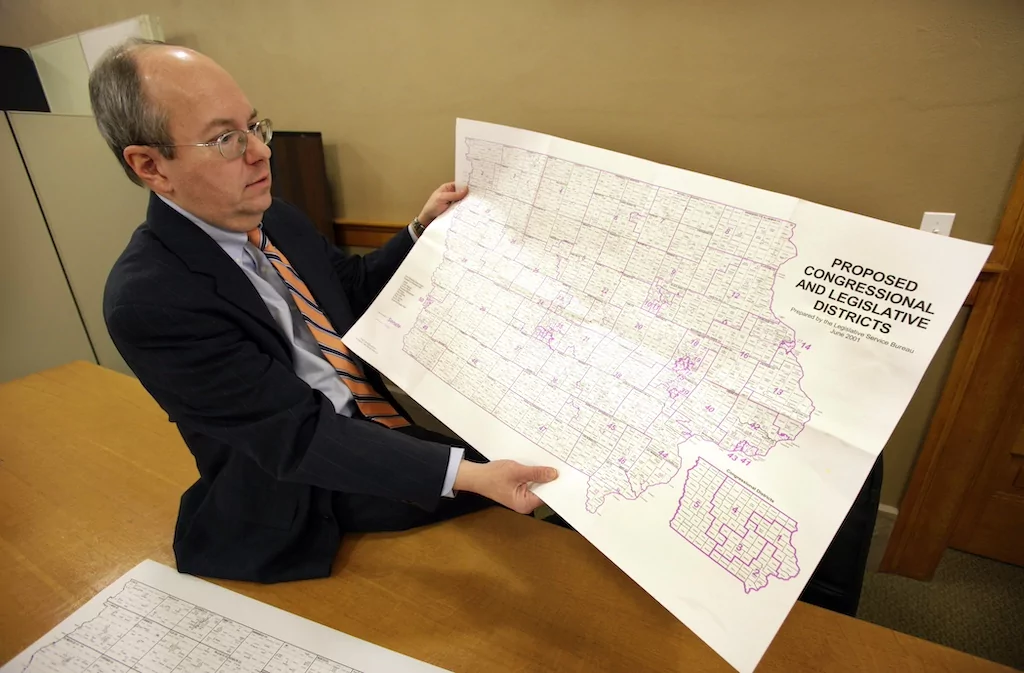

Iowa, the once swing state turned red, has new polling that indicates former President Donald Trump and fellow Republicans may not have entirely wiped away Democrats’ chances of some victories here.
A recent poll from the Des Moines Register showed Trump leading Vice President Kamala Harris by just four points, 47% to 43%, among likely Iowa voters.
Iowa was once a swing state and even a blue-leaning one at that. Prior to Trump’s 2016 win, Iowa voters sent a Democrat to the White House in six of seven elections. The exception was former President George W. Bush’s narrow win here in 2004.
From the 2012 election to the 2020 election, Iowa saw the biggest percentage swing in party wins of any state in a presidential election. Former President Barack Obama won the state by six points in 2012, while Trump captured it by eight points in 2020.
“I would still say that it’s a purple state,” Timothy Hagle, a political science professor at the University of Iowa, told the Washington Examiner. “Republicans have a pretty sizable active voter registration advantage over Democrats right now. We still have a large number of independents, which in Iowa, they’re called ‘no party voters.’”
There are roughly the same number of registered “no party” voters as there are registered Democrats in the state of Iowa.
Hagle said “no party” voters in Iowa are focused on personal issues for them, which he says right now are “jobs, economy, healthcare, those kitchen table type issues, and you can kind of throw in immigration this time, and Democrats are focusing on abortion because that’s a big issue for them.”
“So right now, it seems to be Republicans that the message of Republicans seems to be resonating more with those voters, at least here in Iowa,” he added.
Iowa also has a higher rural population than nearly all other states, with roughly 37% of the state living in a rural area as compared to 63% living in urban areas.
“A lot of the smaller rural counties tend to be dominated by Republicans. It’s not to say there are no Democrats there, but there are lots of more no-party voters, for starters,” Hagle said.
While all four of Iowa’s congressional seats are currently held by Republicans, there are also two competitive House races here this year, in Iowa’s first and third congressional districts. Democrats view the First Congressional District as their best shot at flipping one.
Democrat Christina Bohannan is challenging Rep. Mariannette Miller-Meeks (R-IA). The district includes 20 counties in southeast Iowa, including the mid-sized cities of Iowa City, home to the University of Iowa, and Davenport. The nonpartisan Cook Political Report labels the district as a toss-up, but the House Majority PAC, Democrats’ main super PAC, has reserved $2.3 million in television advertising time for the 1st District race, according to Politico.
Still, recent trends in voter registration may hinder their efforts.
“What’s now Iowa’s First Congressional District used to be the Second Congressional District before redistricting. It had always been liberal. In fact, Democrats still recently had the plurality in the district,” Hagle said. “Now we’ve got the situation where Republican voter registration is actually in favor of Republicans in all four congressional districts.”
“The First Congressional District, in terms of, again, active voter registration — the Republicans lead by a little over 20,000 votes. The no-party voters are going to be the ones that decide in this congressional district,” said.
A generic poll found Republicans trailing Democrats three points here, but the pollster did not name either candidate during the survey, just asking the respondents if they favored having a Republican or Democrat represent them.
Iowa’s Third Congressional District race, between Rep. Zach Nunn (R-IA) and Democratic challenger Lanon Baccam, is also expected to be close. In 2022, Nunn flipped the seat on razor-thin margins, beating incumbent Democrat Cindy Axne by just 2,000 votes.
CLICK HERE TO READ MORE FROM THE WASHINGTON EXAMINER
Three Libertarian congressional candidates were also kicked off the Iowa ballot due to a filing error. Nunn won his seat without a Libertarian candidate in the mix, but the Libertarian candidates all said they would run as write-in candidates.
Republicans are expected to hang on to Iowa’s second and fourth congressional districts.






